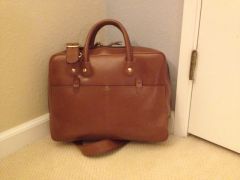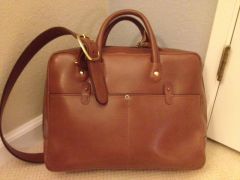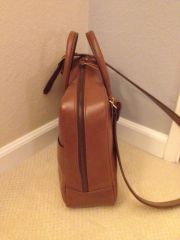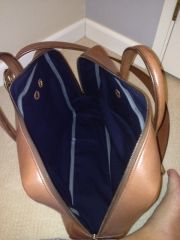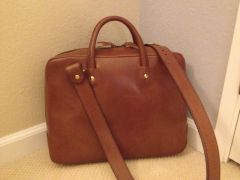-
Posts
719 -
Joined
-
Last visited
Content Type
Profiles
Forums
Events
Blogs
Gallery
Store
Everything posted by Andrew Chee
-
Just a question to everyone on this thread. If you have to sew two pieces grain side to grain side (and then turn the pieces out after sewing), what do you do? Do you just use contact cement on the grain and hope it holds? In my experience, nothing puts a good hold on grain to grain. Andrew
-
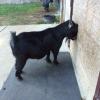
Help To Choose The Correct Sewing Machine
Andrew Chee replied to picola's topic in Leather Sewing Machines
Btw, artisan sewing machines moved to San Francisco. You can look them up cause they have a lot of leather machines. Andrew -
Price dropped to $1100. Andrew
-

Help To Choose The Correct Sewing Machine
Andrew Chee replied to picola's topic in Leather Sewing Machines
I have it up in the for sale section. I had it on Craigslist too. I'm asking $1100 now. Andrew -

Help To Choose The Correct Sewing Machine
Andrew Chee replied to picola's topic in Leather Sewing Machines
If you're interested I'm a flatbed sewing machine, I have a consew 206rb for sale and I'm in your area. As for the techsew, they're not bad. I have a pfaff 335 which is what that machine is a copy of (at least an older model) and they would work just fine for purses. I see my bags on the 335. Andrew -
Sailrite sells a seam tape thats really strong. I use that and it works well. The problem is not none of that stuff holds very well when you're sewing grain to grain around a gusset corner. Glues just don't hold unless you sand the edges and the seam tapes hold ok but tend to come apart at the worse time I'm currently awaiting a special hot melt glue roller from Japan to see if it will solve this problem. Andrew
-
That particular style of servo has a problem with speed control. It's actually relatively easy to fix and there' a video on YouTube telling you how to fix it. I did it with mine and the control now is great Just a thought. Andrew
-

Why The Need For A Single Row Feed Dog W/ Rollers?
Andrew Chee replied to CustomDoug's topic in Leather Sewing Machines
So do people tend not to use rollers on a needle feed machine? If you used a narrow foot, wouldn't you possibly run into a problem with sticking on sticky material? Also, wouldn't a roller be better for sewing right up to the edge even on a needle feed machine? Andrew -

Why The Need For A Single Row Feed Dog W/ Rollers?
Andrew Chee replied to CustomDoug's topic in Leather Sewing Machines
Another question about roller feeds. I see that most people that use the roller setup use drop feed straight stitch machines. I don't see a lot of needle feed machines set up with rollers. Why is that wouldn't a needle feed machine give you more consistent stitch lengths when going around corners? I also don't see any left row feed dog setups for needle feed machines. Why's that? Andrew -
You guys definitely have some interesting tools. I might order from you if you accepted Paypal or credit cards. Western Union and bank transfers just isn't very popular here in the US. Andrew
- 8 replies
-
- leathercraft tools
- tools supplier
- (and 4 more)
-
When you etch onto the hair on sides, does it burn the hair off or does it just darken the hair? Couldn't really tell in the pictures. Also, for the pieces where you etch the edge lines, do you cut the pieces by hand or do you cut them with a laser? Andrew
-
-

Need A Binder Attachment For Either Machine...
Andrew Chee replied to CustomDoug's topic in Leather Sewing Machines
Doesn't look like the 45Ks are made for binders. You may have to rig something up custom to make it work. As for the drop down guides, you may also have a hard time since the head is kinda small. All of the Kwok Hing ones have two horizontal mounting holes and your head doesn't look like it has enough room. I put one of these on my Artisan Toro 3000: http://shop.raphaelsewing.com/index.php?main_page=product_info&cPath=7_46&products_id=518 This one might work better cause the mounting holes are vertical so they might fit your head. With that said, I have no idea whether it will actually fit or not. I'm actually not that hot on this guide either. There is nothing that locks it in place when it's in the down position. When you're sewing heavy leather, there is always a little bit of up and down vibration of the leather as it's sewing along and I found that it's enough to slowly lift the edge guide up and eventually disengage it. Andrew -
I've tried something similar to this. I think it's called a French edge. Same as what you have except you sew over the rolled edge instead of next to it. I've only done it when The back isn't shown though. Your backs are nicely done with the covering piece of leather. Very clean. Andrew
-
Hello all. This is the latest briefcase that I've made. It's W&C medium brown skirting leather finished with my one leather finish. The lining is a navy herringbone wool. I think things turned out ok this time although the binding was a pain to do. Andrew
-
From the album: Medium Brown Briefcase
-
From the album: Medium Brown Briefcase
-
From the album: Medium Brown Briefcase
-
From the album: Medium Brown Briefcase
-
From the album: Medium Brown Briefcase
-
Hey trevor, do you have pics of the back of your straps? Andrew
-
I know this is a long shot but does anyone have one of these and have used them and might know where to get one? I've been looking for a solution for gluing the edges prior to assembly. I was looking at these big edge gluers but this little thing looks like it just might work really well and it will hopefully be less expensive too. Anyways, any info would be appreciated. Thanks. http://www.nippy.jp/en/2013/1141.html Youtube: Andrew
-
Hey royal, this is a Puritan machine. I went and checked them out. You should talk to the guy about his other machines as well cause he's got a lot of different machines coming up for sale. He's gonna have an Adler 205 and a Seiko CH8 or something like that. those would be much better fr holsters. The Puritan is a chain stitch machine so the back will look completely different. They're great machines but probably not for holsters. Anyways, PM me if you want tO find out hat else he's selling cause he's got a lot for sale. Andrew
-
No, grades do not work like that. Horween has a strange grading system for their shells: Grade #1: 2.75 SF Grade X: 2.25 SF Grade #2: 1.75 SF Grade #3: 1.50 SF Grade #4: 1.25 SF Grade #5: 1.00 SF Chips: 1 SF and under They do not sell their shells by the square feet. The larger the shells, the more expensive they are (when calculated by square footage). I guess it makes sense since the larger shells are more rare then the smaller ones. Andrew
-
I saw this in a japanese magazine. It was for cutting tight curves, not circles necessarily but the concept applies. You place your template over the leather, then instead of trying to cut along the curve with a knife, you cut straight down, then you make small downward cuts taking a small wedge of leather with you each time. If you cut wedges that are small enough, the end results looks like a pretty decent curve. Something worth trying... Andrew



